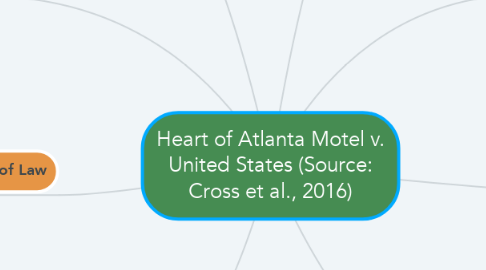
1. Facts
1.1. Parties
1.1.1. Heart of Atlanta Motel
1.1.2. United States of America
1.2. What Happened
1.2.1. The owner of the Heart of Atlanta Motel denied providing rooms to African Americans.
1.2.2. Owner believed the Civil Rights Act of 1964 was unconstitutional, and that his hotel did not fall under the purview of the act because it operated locally.
1.3. Procedural History
1.3.1. Owner brought an action to the federal district court that the Civil Rights Act of 1964 was unconstitutional
1.3.2. District court ruled that the act was not unconstitutional; owner was prohibited to continue to discriminate
1.3.3. Owner appealed, and the case ended up in Supreme Court
2. Issue
2.1. Is the Civil Rights Act of 1964 unconstitutional?
3. Rule of Law
3.1. Three common tests to determine constitutionality of a law
3.1.1. Rational Basis
3.1.1.1. Is the law tied to a legitimate Government pupose?
3.1.2. Intermediate Scrutiny
3.1.2.1. Does the law address an important purpose?
3.1.3. Strict Scrutiny
3.1.3.1. Is the purpose "compelling" and does the law address that purpose in "the least restrictive way"?
4. Application
4.1. Rational Basis
4.1.1. The law helps the government ensure that all people are treated equally.
4.1.1.1. In the case of the Heart of Atlanta Motel v. U.S., African Americans faced a clear discrimination while traveling, and are often unable to obtain overnight accommodations.
4.2. Intermediate Scrutiny
4.2.1. The Civil Rights Act of 1964 protects the notion that "all people are created equally" by ensuring fair treatment of everyone.
4.2.1.1. By not offering African Americans the same opportunities in travel, African Americans were discouraged from traveling, which hinders economical growth across borders.
4.3. Strict Scrutiny
4.3.1. Congress has the right to create legislation, such as the Civil Rights Act of 1964, because they have the power to "regulate interstate commerce" which "permitted the enactment of legislation that could halt local discriminatory practices.
4.3.1.1. Although the Heart of Atlanta Motel claims to operate only locally, it is clear that many of its clientele were interstate travelers. This makes the hotel liable to the Civil Rights Act of 1964 and any interstate laws.
5. Conclusion
5.1. U.S. Supreme Court declared the Civil Rights Act of 1964 to be constitutional
5.2. Interstate commerce is under the purview of Congress, thereby allowing the regulation of local businesses
6. Impact
6.1. Katzenbach v. McClung
6.1.1. Racial discrimination at restaurants, which received the food that they served from other states, is unconstitutional on the grounds of impacting interstate commerce. Source: Katzenbach v. McClung, 379 U.S. 294, 85 S. Ct. 377, 13 L. Ed. 2d 290 (1964)
6.2. Hamm v. City of Rock Hill
6.2.1. Discrimination in public places is unconstitutional, and any attempts to receive equal service at public places are not punishable by law ("sit-ins"). Source: Hamm v. City of Rock Hill, 379 U.S. 306, 85 S. Ct. 384, 13 L. Ed. 2d 300 (1964)
